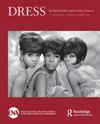WOMEN EMPOWERED: Fashions from the Frontline
IF 0.3
4区 社会学
0 HUMANITIES, MULTIDISCIPLINARY
Dress-The Journal of the Costume Society of America
Pub Date : 2021-01-02
DOI:10.1080/03612112.2021.1887688
引用次数: 0
Abstract
In November 2018, CNN, Teen Vogue, The Hill, and even Fox News reported that Alexandria Ocasio-Cortez (AOC) had loaned her shoes to a fashion exhibit at Cornell University (FIGURE 1). Worn-through shoes would typically be excluded from fashion collections, except that this pair had a special significance: the dirt and holes illustrated the miles of New York City blocks AOC walked as she went door-to-door gathering signatures for her campaign for New York’s Fourteenth Congressional District. Her shoes are also a refreshing testament to democracy—she did not buy her votes or seat; rather, she devoted the energy and put in the painstaking work of talking to the everyday-voting public to marshal support for her political bid. Thus, AOC’s shoes encapsulate the heart and soul of this exhibition and fashion studies in general: clothes matter, their materiality and the way they are worn (or worn-through) matter, and they matter profoundly for what we think is possible. This exhibition tells the story of how women, from the end of the nineteenth century to the present, have used dress and accouterments indirectly in roles that challenged the status quo and directly to assert their political rights and take their rightful positions in public spaces. Professor Denise Nicole Green, faculty advisor of the exhibition, explained in an interview that the overall aim was to showcase the concrete and specific material culture and garments of women’s lives to illustrate how fashion is a vehicle for political change and how “people who are marginalized use Promotional material for the exhibition featuring an archival photograph of Coretta Scott King speaking at a labor rally. Courtesy of the Kheel Center for LaborManagement Documentation & Archives at Cornell University赋予女性权力:来自前线的时尚
2018年11月,CNN、《Teen Vogue》、The Hill甚至福克斯新闻都报道了亚历山大·奥卡西奥·科尔特斯(Alexandria Ocasio-Cortez)将她的鞋子借到了康奈尔大学的一个时装展览上(图1)。穿破的鞋子通常被排除在时装系列之外,但这双鞋有一个特殊的意义:这双鞋上的污垢和洞表明了AOC在挨家挨户为纽约第十四届国会选区的竞选活动收集签名时走过的纽约市街区。她的鞋子也是民主令人耳目一新的证明——她没有花钱买选票或席位;相反,她投入了精力,投入了艰苦的工作,与日常投票的公众交谈,以争取对她政治竞选的支持。因此,AOC的鞋子概括了这次展览和时尚研究的核心和灵魂:衣服很重要,它们的物质性和穿着(或磨损)的方式很重要,它们对我们认为可能发生的事情有着深远的影响。本次展览讲述了从19世纪末到现在,女性如何间接地在挑战现状的角色中使用服装和配饰,并直接维护她们的政治权利,并在公共空间中占据应有的地位。展览的指导老师丹尼斯·妮可·格林(Denise Nicole Green)教授在接受采访时解释说,展览的总体目标是展示女性生活中具体而具体的物质文化和服装,以说明时尚是如何成为政治变革的工具,以及“被边缘化的人如何利用科蕾塔·斯科特·金(Coretta Scott King)在劳工集会上讲话的档案照片作为展览的宣传材料。”康奈尔大学基尔劳动管理文档与档案中心提供
本文章由计算机程序翻译,如有差异,请以英文原文为准。
求助全文
约1分钟内获得全文
求助全文
来源期刊

Dress-The Journal of the Costume Society of America
HUMANITIES, MULTIDISCIPLINARY-
CiteScore
0.20
自引率
0.00%
发文量
28
 求助内容:
求助内容: 应助结果提醒方式:
应助结果提醒方式:


